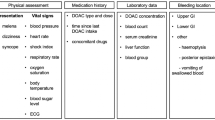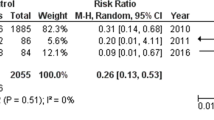Abstract
Purpose of review
To characterize cardiac patients at greatest risk of antithrombotic-related gastrointestinal bleeding (GIB), clarify modifiable risk factors, and summarize best-practice preventive management strategies based on patient characteristics.
Recent findings
Recent study findings reinforce risk factors in this patient cohort, including advanced age and a history of bleeding events. Data also highlight the importance of managing polypharmacy, renal impairment, and eradication of Helicobacter pylori, as well as the utilization of proton pump inhibitors (PPI) for gastroprotection.
Summary
This narrative review will provide up-to-date best practice recommendations to guide clinicians in the management of antithrombotic drugs in elderly cardiac patients and in the prevention of antithrombotic-related GIB.

Similar content being viewed by others
References and Recommended Reading
Papers of particular interest, published recently, have been highlighted as: • Of importance •• Of major importance
•• Abraham NS, Noseworthy PA, Yao X, Sangaralingham LR, Shah ND. Gastrointestinal safety of direct oral anticoagulants: a large population-based study. Gastroenterology. 2017;152(5):1014-22.e1. One of the first direct head-to-head comparisons of DOAC agents and their associated risk for GIB among elderly patients. Abraham et al highlight the importance of advanced age as a risk factor and among DOACs, apixaban possessed the best safety profile across all age groups.
•• Abraham NS, Noseworthy PA, Inselman J, Herrin J, Yao X, Sangaralingham LR, et al. Risk of gastrointestinal bleeding increases with combinations of antithrombotic agents and patient age. Clin Gastroenterol Hepatol. 2020;18(2):337-46.e19. A recent, comprehensive observational study on GIB risk in patients with multiple comorbid cardiovascular conditions on various antithrombotic regimens. This study shows the importance of advancing age and polypharmacy acting synergistically to significantly increase risk.
Abraham NS, Horsley-Silva JL. Gastrointestinal bleeding secondary to the new anticoagulants. Curr Opin Gastroenterol. 2016;32(6):474–80.
Palmerini T, BacchiReggiani L, Della Riva D, Romanello M, Feres F, Abizaid A, et al. Bleeding-related deaths in relation to the duration of dual-antiplatelet therapy after coronary stenting. J Am Coll Cardiol. 2017;69(16):2011–22.
Koskinas KC, Räber L, Zanchin T, Wenaweser P, Stortecky S, Moschovitis A, et al. Clinical impact of gastrointestinal bleeding in patients undergoing percutaneous coronary interventions. Circ Cardiovasc Interv. 2015;8(5).
Abraham NS. New clinical paradigms for treating and preventing antiplatelet gastrointestinal bleeding. Curr Opin Gastroenterol. 2017;33(6):467–72.
• Li L, Geraghty OC, Mehta Z, Rothwell PM. Age-specific risks, severity, time course, and outcome of bleeding on long-term antiplatelet treatment after vascular events: a population-based cohort study. Lancet. 2017;390(10093):490–9. The findings from this prospective population-based cohort study demonstrated that major GIBs in patients > 75 years receiving aspirin were disabling or fatal and substantially outnumbered intracerebral hemorrhage. Important factors related to bleeds, including severity, case fatality and poor functional outcome, were significantly increased with advanced age.
Abraham NS, Singh S, Alexander GC, Heien H, Haas LR, Crown W, et al. Comparative risk of gastrointestinal bleeding with dabigatran, rivaroxaban, and warfarin: population based cohort study. BMJ. 2015;350:h1857.
Avgil-Tsadok M, Jackevicius CA, Essebag V, Eisenberg MJ, Rahme E, Behlouli H, et al. Dabigatran use in elderly patients with atrial fibrillation. Thromb Haemost. 2016;115(1):152–60.
Graham DJ, Reichman ME, Wernecke M, Zhang R, Southworth MR, Levenson M, et al. Cardiovascular, bleeding, and mortality risks in elderly Medicare patients treated with dabigatran or warfarin for nonvalvular atrial fibrillation. Circulation. 2015;131(2):157–64.
• Romanelli RJ, Nolting L, Dolginsky M, Kym E, Orrico KB. Dabigatran versus warfarin for atrial fibrillation in real-world clinical practice: a systematic review and meta-analysis. Circ Cardiovasc Qual Outcomes. 2016;9(2):126–34. A systematic review and meta-analysis evaluating real-world evidence for the safety and efficacy of dabigatran versus warfarin in patients with NVAF. Romanelli et al. demonstrated that dabigatran is associated with a decreased risk for intracranial bleeding compared to warfarin, but a 50% increased risk for GIB, especially in patients aged > 75 years.
Lai CL, Chen HM, Liao MT, Lin TT. Dabigatran, rivaroxaban, and warfarin in the oldest adults with atrial fibrillation in Taiwan. J Am Geriatr Soc. 2018;66(8):1567–74.
Tang J, Sharma U, Desai S, Molnar J, Perlmuter L, Feller A, et al. A study of proton pump inhibitors and other risk factors in warfarin-associated gastrointestinal bleeding. Cureus. 2021;13(1):e12624.
Sengupta N, Marshall AL, Jones BA, Ham S, Tapper EB. Rebleeding vs thromboembolism after hospitalization for gastrointestinal bleeding in patients on direct oral anticoagulants. Clin Gastroenterol Hepatol. 2018;16(12):1893-900.e2.
Yamato H, Abe K, Osumi S, Yanagisawa D, Kodashima S, Asaoka Y, et al. Clinical factors associated with safety and efficacy in patients receiving direct oral anticoagulants for non-valvular atrial fibrillation. Sci Rep. 2020;10(1):20144.
• Harskamp RE, Teichert M, Lucassen WAM, van Weert H, Lopes RD. Impact of polypharmacy and P-glycoprotein- and CYP3A4-modulating drugs on safety and efficacy of oral anticoagulation therapy in patients with atrial fibrillation. Cardiovasc Drugs Ther. 2019;33(5):615–23. A systematic review and meta-analysis evaluating the effects of polypharmacy and drug-drug interactions on the safety and efficacy of DOACs compared to warfarin. Harskamp et al. found that patients prescribed a higher number of concomitant drugs had increased rates of mortality and major bleeding overall.
Hanigan S, Das J, Pogue K, Barnes GD, Dorsch MP. The real world use of combined P-glycoprotein and moderate CYP3A4 inhibitors with rivaroxaban or apixaban increases bleeding. J Thromb Thrombolysis. 2020;49(4):636–43.
Bouget J, Balusson F, Viglino D, Roy PM, Lacut K, Pavageau L, et al. Major bleeding risk and mortality associated with antiplatelet drugs in real-world clinical practice. A prospective cohort study. PLoS One. 2020;15(8):e0237022.
Maruyama K, Yamamoto T, Aoyagi H, Isono A, Abe K, Kodashima S, et al. Difference between the upper and the lower gastrointestinal bleeding in patients taking nonvitamin K oral anticoagulants. Biomed Res Int. 2018;2018:7123607.
Ray WA, Chung CP, Murray KT, Smalley WE, Daugherty JR, Dupont WD, et al. Association of oral anticoagulants and proton pump inhibitor cotherapy with hospitalization for upper gastrointestinal tract bleeding. JAMA. 2018;320(21):2221–30.
Valgimigli M, Bueno H, Byrne RA, Collet J-P, Costa F, Jeppsson A, et al. 2017 ESC focused update on dual antiplatelet therapy in coronary artery disease developed in collaboration with EACTS. Eur J Cardiothorac Surg. 2018;53(1):34–78.
Lip GYH, Banerjee A, Boriani G, Chiang CE, Fargo R, Freedman B, et al. Antithrombotic therapy for atrial fibrillation: CHEST guideline and expert panel report. Chest. 2018;154(5):1121–201.
Desilets AR, Asal NJ, Dunican KC. Considerations for the use of proton-pump inhibitors in older adults. Consult Pharm. 2012;27(2):114–20.
Suceveanu AI, Suceveanu AP, Parepa I, Mazilu L, Pantea-Stoian A, Diaconu C, et al. Reducing upper digestive bleeding risk in patients treated with direct oral anticoagulants and concomitant infection with Helicobacter pylori. Exp Ther Med. 2020;20(6):205.
Guo CG, Cheung KS, Zhang F, Chan EW, Chen L, Wong ICK, et al. Delay in retreatment of Helicobacter pylori infection increases risk of upper gastrointestinal bleeding. Clin Gastroenterol Hepatol. 2021;19(2):314-22.e2.
Jackevicius CA, Lu L, Ghaznavi Z, Warner AL. Bleeding risk of direct oral anticoagulants in patients with heart failure and atrial fibrillation. Circ Cardiovasc Qual Outcomes. 2021;14(2):e007230.
Yao X, Tangri N, Gersh BJ, Sangaralingham LR, Shah ND, Nath KA, et al. Renal outcomes in anticoagulated patients with atrial fibrillation. J Am Coll Cardiol. 2017;70(21):2621–32.
Acknowledgements
Dr. Abraham and Ms. Huynh are the authors of this manuscript.
Funding
This research was funded by grant R01HS025-402 (Dr. Abraham) from the Agency for Healthcare Research and Quality.
Author information
Authors and Affiliations
Corresponding author
Ethics declarations
Conflict of Interest
Neena Abraham declares no conflict of interest and Kimberly Huynh declares no conflict of interest.
Human and Animal Rights and Informed Consent
This article does not contain any studies with human or animal subjects performed by any of the authors.
Additional information
Publisher's Note
Springer Nature remains neutral with regard to jurisdictional claims in published maps and institutional affiliations.
Key points
• Patient characteristics including advanced age and history of bleeding are associated with an increased risk of antithrombotic-related GIB.
• Appropriately managing polypharmacy and concomitant prescription of antithrombotic agents decreases the risk of major bleeding events and mortality.
• Utilizing PPI in patients at increased risk for upper GIB greatly decreases the risk of future bleeding events.
• Identification and successful eradication of H. pylori within 3 months of upper GIB are associated with decreased incidence of future UGIB.
• Routine monitoring of renal function in DOAC-treated patients is necessary for identifying individuals who would benefit from dose reduction to prevent excess DOAC plasma levels and decrease the risk of adverse events.
This article is part of the Topical Collection on Geriatrics
Rights and permissions
About this article
Cite this article
Huynh, K., Abraham, N.S. Cardiogastroenterology: Management of Elderly Cardiac Patients at Risk of GIB. Curr Treat Options Gastro 19, 573–582 (2021). https://doi.org/10.1007/s11938-021-00361-y
Accepted:
Published:
Issue Date:
DOI: https://doi.org/10.1007/s11938-021-00361-y




